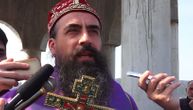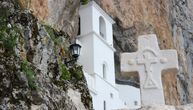What controversial Law on Freedom of Religion says: Legislature to seize Serbian shrines
There are several disputed articles in the law, the key being the one that implies that all religious communities must prove that they owned church property before 1918, or have that property seized.
During the night in the Assembly of Montenegro, the controversial Law on Freedom of Religion was adopted in a heated atmosphere. There were incidents and clashes in the assembly hall when opposition Democratic Front MPs began to break the microphone and other devices on the table of the speaker.
At one point, a blast echoed in the hall, and security guards rushed in with gas masks. Following the incident, as many as 22 people were detained by the police, including 17 from the Democratic Front.
The adopted law has caused a lot of controversy, mostly because it practically allows for the seizure of the property of the Serbian Orthodox Church (SPC).
Disputed articles
There are several disputed articles in the law, the key being the one that says all religious communities must prove that they owned church property before 1918, or have that property seized.
The same article further states that religious facilities built in the territory of Montenegro through joint ventures of citizens by December 1, 1918, for which there is no evidence of property rights, will become state property, as cultural heritage.
The next article states that "the administrative authority competent for property affairs must, within one year from the day this law enters into force, establish which religious facilities and land, within the scope of Article 52 of this law, are state property, make an inventory and apply to register state property rights over these real estate in the real estate registry."
Also, the administration must register the request within 15 days from the date of submission and without delay inform the religious community that uses the said facilities and land.
If the property is found to be state property, the religious community will continue to use the property and land.
"Once the the decision registering state property rights in the real estate register in accordance with Article 62, paragraphs 1 and 2 comes into effect, the religious community shall continue to use the objects and land subject to registration until the decision of the state body competent to decide on the holding, use and disposal of these objects and land."
Several months of protests
The announcement of the adoption of the law several months ago led to an increase in tensions in the region. Following the announcement that the law would soon be in the parliamentary procedure, a large protest was organized in Niksic, when a statement criticizing the law was read before several thousand citizens, followed by letters of support received by the Serbian Orthodox Church, including from the pope and the Russian patriarch.
On Wednesday and Thursday, protests were organized across Montenegro. Podgorica was under siege yesterday as police closed off the city center ahead of the Assembly session.
At one point, there was hope that the adoption of the law would be delayed, as Montenegrin Prime Minister Dusko Markovic agreed to speak with Metropolitan Amfilohije. However, although Amfilohije demanded that the law be withdrawn or the adoption delayed for after the Christmas holiday (January 7), that didn't happen and the law was passed late last night.
Croatians gloat
The adoption of the Law on Freedom of Religion has been closely monitored in neighboring Croatia.
Jutarnji List daily has shown malice towards Serbia and the Serbian Orthodox Church, announcing that "Belgrade is inciting the atmosphere with the help of Chetnik Mandic."
Thus, the Croats called this law "the last act of establishing the Montenegrin nation and statehood, and even in some way a final suppression of the (great) Serbian identity from the Montenegrin national being."
Jutarnji List also recognizes in this law a tool that will force the SPC to "return a good portion of its property to the Montenegrin Orthodox Church, which is currently unrecognized by other Orthodox Churches."
(I.N.)

